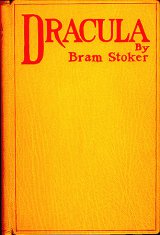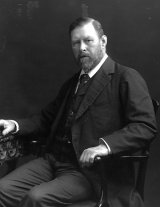Dracula Page #35
Dracula is an 1897 Gothic horror novel by Irish author Bram Stoker. It introduced Count Dracula, and established many conventions of subsequent vampire fantasy. The novel tells the story of Dracula's attempt to move from Transylvania to England so that he may find new blood and spread the undead curse, and of the battle between Dracula and a small group of men and a woman led by Professor Abraham Van Helsing.
"Well, my dear, what could I say? I could only tell him that I was the happiest woman in all the wide world, and that I had nothing to give him except myself, my life, and my trust, and that with these went my love and duty for all the days of my life. And, my dear, when he kissed me, and drew me to him with his poor weak hands, it was like a very solemn pledge between us.... "Lucy dear, do you know why I tell you all this? It is not only because it is all sweet to me, but because you have been, and are, very dear to me. It was my privilege to be your friend and guide when you came from the schoolroom to prepare for the world of life. I want you to see now, and with the eyes of a very happy wife, whither duty has led me; so that in your own married life you too may be all happy as I am. My dear, please Almighty God, your life may be all it promises: a long day of sunshine, with no harsh wind, no forgetting duty, no distrust. I must not wish you no pain, for that can never be; but I do hope you will be always as happy as I am now. Good-bye, my dear. I shall post this at once, and, perhaps, write you very soon again. I must stop, for Jonathan is waking--I must attend to my husband! "Your ever-loving "MINA HARKER." Letter, Lucy Westenra to Mina Harker. "Whitby, 30 August. "My dearest Mina,-- "Oceans of love and millions of kisses, and may you soon be in your own home with your husband. I wish you could be coming home soon enough to stay with us here. The strong air would soon restore Jonathan; it has quite restored me. I have an appetite like a cormorant, am full of life, and sleep well. You will be glad to know that I have quite given up walking in my sleep. I think I have not stirred out of my bed for a week, that is when I once got into it at night. Arthur says I am getting fat. By the way, I forgot to tell you that Arthur is here. We have such walks and drives, and rides, and rowing, and tennis, and fishing together; and I love him more than ever. He tells me that he loves me more, but I doubt that, for at first he told me that he couldn't love me more than he did then. But this is nonsense. There he is, calling to me. So no more just at present from your loving "LUCY. "P. S.--Mother sends her love. She seems better, poor dear. "P. P. S.--We are to be married on 28 September." Dr. Seward's Diary. 20 August.--The case of Renfield grows even more interesting. He has now so far quieted that there are spells of cessation from his passion. For the first week after his attack he was perpetually violent. Then one night, just as the moon rose, he grew quiet, and kept murmuring to himself: "Now I can wait; now I can wait." The attendant came to tell me, so I ran down at once to have a look at him. He was still in the strait-waistcoat and in the padded room, but the suffused look had gone from his face, and his eyes had something of their old pleading--I might almost say, "cringing"--softness. I was satisfied with his present condition, and directed him to be relieved. The attendants hesitated, but finally carried out my wishes without protest. It was a strange thing that the patient had humour enough to see their distrust, for, coming close to me, he said in a whisper, all the while looking furtively at them:-- "They think I could hurt you! Fancy me hurting you! The fools!" It was soothing, somehow, to the feelings to find myself dissociated even in the mind of this poor madman from the others; but all the same I do not follow his thought. Am I to take it that I have anything in common with him, so that we are, as it were, to stand together; or has he to gain from me some good so stupendous that my well-being is needful to him? I must find out later on. To-night he will not speak. Even the offer of a kitten or even a full-grown cat will not tempt him. He will only say: "I don't take any stock in cats. I have more to think of now, and I can wait; I can wait." After a while I left him. The attendant tells me that he was quiet until just before dawn, and that then he began to get uneasy, and at length violent, until at last he fell into a paroxysm which exhausted him so that he swooned into a sort of coma. * * * * * ... Three nights has the same thing happened--violent all day then quiet from moonrise to sunrise. I wish I could get some clue to the cause. It would almost seem as if there was some influence which came and went. Happy thought! We shall to-night play sane wits against mad ones. He escaped before without our help; to-night he shall escape with it. We shall give him a chance, and have the men ready to follow in case they are required.... * * * * * 23 August.--"The unexpected always happens." How well Disraeli knew life. Our bird when he found the cage open would not fly, so all our subtle arrangements were for nought. At any rate, we have proved one thing; that the spells of quietness last a reasonable time. We shall in future be able to ease his bonds for a few hours each day. I have given orders to the night attendant merely to shut him in the padded room, when once he is quiet, until an hour before sunrise. The poor soul's body will enjoy the relief even if his mind cannot appreciate it. Hark! The unexpected again! I am called; the patient has once more escaped. * * * * * Later.--Another night adventure. Renfield artfully waited until the attendant was entering the room to inspect. Then he dashed out past him and flew down the passage. I sent word for the attendants to follow. Again he went into the grounds of the deserted house, and we found him in the same place, pressed against the old chapel door. When he saw me he became furious, and had not the attendants seized him in time, he would have tried to kill me. As we were holding him a strange thing happened. He suddenly redoubled his efforts, and then as suddenly grew calm. I looked round instinctively, but could see nothing. Then I caught the patient's eye and followed it, but could trace nothing as it looked into the moonlit sky except a big bat, which was flapping its silent and ghostly way to the west. Bats usually wheel and flit about, but this one seemed to go straight on, as if it knew where it was bound for or had some intention of its own. The patient grew calmer every instant, and presently said:-- "You needn't tie me; I shall go quietly!" Without trouble we came back to the house. I feel there is something ominous in his calm, and shall not forget this night.... Lucy Westenra's Diary Hillingham, 24 August.--I must imitate Mina, and keep writing things down. Then we can have long talks when we do meet. I wonder when it will be. I wish she were with me again, for I feel so unhappy. Last night I seemed to be dreaming again just as I was at Whitby. Perhaps it is the change of air, or getting home again. It is all dark and horrid to me, for I can remember nothing; but I am full of vague fear, and I feel so weak and worn out. When Arthur came to lunch he looked quite grieved when he saw me, and I hadn't the spirit to try to be cheerful. I wonder if I could sleep in mother's room to-night. I shall make an excuse and try.
Translation
Translate and read this book in other languages:
Select another language:
- - Select -
- 简体中文 (Chinese - Simplified)
- 繁體中文 (Chinese - Traditional)
- Español (Spanish)
- Esperanto (Esperanto)
- 日本語 (Japanese)
- Português (Portuguese)
- Deutsch (German)
- العربية (Arabic)
- Français (French)
- Русский (Russian)
- ಕನ್ನಡ (Kannada)
- 한국어 (Korean)
- עברית (Hebrew)
- Gaeilge (Irish)
- Українська (Ukrainian)
- اردو (Urdu)
- Magyar (Hungarian)
- मानक हिन्दी (Hindi)
- Indonesia (Indonesian)
- Italiano (Italian)
- தமிழ் (Tamil)
- Türkçe (Turkish)
- తెలుగు (Telugu)
- ภาษาไทย (Thai)
- Tiếng Việt (Vietnamese)
- Čeština (Czech)
- Polski (Polish)
- Bahasa Indonesia (Indonesian)
- Românește (Romanian)
- Nederlands (Dutch)
- Ελληνικά (Greek)
- Latinum (Latin)
- Svenska (Swedish)
- Dansk (Danish)
- Suomi (Finnish)
- فارسی (Persian)
- ייִדיש (Yiddish)
- հայերեն (Armenian)
- Norsk (Norwegian)
- English (English)
Citation
Use the citation below to add this book to your bibliography:
Style:MLAChicagoAPA
"Dracula Books." Literature.com. STANDS4 LLC, 2024. Web. 26 Nov. 2024. <https://www.literature.com/book/dracula_10>.




Discuss this Dracula book with the community:
Report Comment
We're doing our best to make sure our content is useful, accurate and safe.
If by any chance you spot an inappropriate comment while navigating through our website please use this form to let us know, and we'll take care of it shortly.
Attachment
You need to be logged in to favorite.
Log In